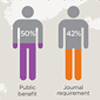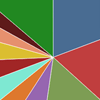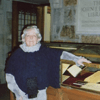Join Carli Spina (Head Librarian, Assessment and Outreach, O’Neill Library) to learn about TAGS, a tool that allows you to harvest tweets, archive them in a Google Sheet, and then analyze them.
Month: June 2016
Dictionary of American Regional English
Published by Harvard University Press, the digital edition of this print reference work features audio, interactive maps, and insights into the DARE Survey.
PBS Video Collection, 2nd Edition
A collection of 245 streaming video titles, this resource offers documentaries on subjects in history, science and technology, diversity studies, business, and current events.
Colonial America
A major digital collection of largely manuscript material, Colonial America will, when completed, consist of 1,450 volumes of files held at The National Archives in London. It provides a variety of ways of exploring its contents, including Data Associations which allows the user to identify and explore the most common persons, places or keywords occurring in documents written by a particular person, written in a particular place, or containing a certain keyword.
Scopus
Try Scopus, a multidisciplinary research tool, now at Boston College in 2016. Covering journal articles, books, patents and more, use it to research the literature, but also to analyze and visualize research productivity and trends, by topic, author, institution and more. Also compare journals with its built-in comparison tool.
Launching Dataverse
Barbara Mento discusses the launch of BC’s instance of Dataverse and explains the advantages of using the platform.
On April 19th, the Boston College Libraries will launch a new Boston College Dataverse to provide easy access to the scholarly data produced by members of the Boston College community.

Boston College Dataverse is a multi-disciplinary data repository which makes it easy to upload your research data to improve impact, visibility and access. Deposited data will automatically generate citation information and a Digital Object Identifier (DOI) that can be used to cite your data and link to related publications and presentations or to share with colleagues who request your data. BC Dataverse complements eScholarship@BC, our institutional repository, by providing a seamless link from your publications to the accompanying research data and from your data to your publications. First unveiled during Research Day’s Big Data program on March 16th, BC Dataverse can fulfill funding agencies’ Data Management Plan requirements or journal recommendations /requirements for making data supporting a publication available for replication of analysis.
Technology
Dataverse is a platform designed specifically for data management, with features including version control and data analysis. It is hosted and supported by Harvard University in collaboration with Harvard University IT and the Institute for Quantitative Social Science (IQSS). The Dataverse platform hosts data archives from around the world and has been used by journals such as Review of Economics and Statistics since 2010. A benefit of this platform is that researchers can deposit varied formats from across disciplines including GIS shapefiles”. There is a 2GB per file limit, but there can be accommodations for depositors with larger files. Dataverse automatically converts tabular data, such as spreadsheets, to the .tab format, an open, nonproprietary format. An “Explore” button then allows visualization of the data online.
The system also conforms to the Open Archives Initiative Protocol for Metadata Harvesting (OAI-PMH), meaning that descriptive information about materials published in the repository are accessible to major search engines such as Google and Yahoo, ensuring maximum exposure.
SUPPORT
While Dataverse has an extensive online help section, we have created a customised Quick Guide to guide you through the data deposit process. A metadata template helps select language for better discoverability. You can visit our Dataverse at Boston College Research Guide with help links and additional information. We are also happy to schedule a meeting with you to help with your data deposit.
WHY DEPOSIT YOUR DATA?
A few more good reasons to deposit your data in BC Dataverse:
- Facilitates fulfillment of requests from others to see your data
- Provides usage counts for access to your data
- Set access and usage permissions
- Fits into “responsible conduct of research”
- Reduce risk of data loss for you and the University
Want to learn more? Contact: dataverse-support@bc.edu
Research Centers on eScholarship@BC
Emily Toner describes recent efforts to add content created by BC’s research centers to BC’s institutional repository, eScholarship@BC.
As Boston College’s institutional repository, eScholarship@BC showcases and preserves the scholarly output of the University. Archiving the publications of its research centers is an important part of that. Currently, there are over 1300 works in eScholarship@BC from research centers on campus. These include articles, reports, working papers, e-books, and videos. Over the past year, the library has reached out to many centers and has added substantially to these collections.
Here are highlights of recent additions to eScholarship@BC from research centers:
Center for Retirement Research
eScholarship@BC now has a comprehensive collection of reports and working papers from the Center for Retirement Research (CRR), ranging from 1999 to present. The topics covered in these publications include Social Security, state and local pensions, health/long-term care, financing retirement, and older workers. The total collection now includes 371 working papers and 315 reports, including their “Issue in Brief” and “State and Local Pension Plans” series. For more information about CRR, please visit its website.
TIMSS & PIRLS International Study Center
A collection of fifty publications from the TIMSS & PIRLS International Study Center was also added to eScholarship@BC in the last year. For two decades, TIMSS & PIRLS has published research related to its assessments of student achievement around the world. TIMSS & PIRLS is based at the Lynch School of Education and is a part of the International Association for the Evaluation of Educational Achievement. In addition to the electronic copies in eScholarship@BC, the library also now has print volumes of these resources in our collections. For more information about TIMSS & PIRLS, please visit its website.
Center on Wealth and Philanthropy
In the spring of 2015, we added to our existing collection of works from the Center on Wealth and Philanthropy (CWP), in anticipation of its closure later that year. In total, there are now 70 publications from the center, including reports, statistics, and working papers. These works represent many decades worth of research and scholarly output from the center regarding philanthropy. Even though the center is now closed, this digital content will continue to be preserved by the library for the long term.
Church in the 21st Century Center
Over the years, the library has also worked with the Church in the 21st Century center (C21) to archive and provide additional access to the center’s online webcasts of C21-sponsored events on campus as well as other publications. The collection of C21 webcasts in eScholarship@BC currently includes over 200 videos (from 2011 through 2014, plus select videos from the 2000’s). The eScholarship@BC team is continuing to work with the center to add additional videos and to develop this collection further going forward. In addition to the material in eScholarship@BC, the library has also archived the C21 Resources magazine on newspapers.bc.edu. For more information about C21, please visit its website.
In addition to the recent work with these centers, eScholarship@BC also includes publications from other centers, including the Center for Human Rights and International Justice, the Center on Aging & Work (262 publications), and the Sloan Work and Family Research Network (75 papers). For more information about eScholarship@BC’s collaboration with Boston College research centers, please feel free to visit the eScholarship@BC website or contact Emily Toner (emily.toner@bc.edu), eScholarship Repository Librarian.
Scopus – Have You Tried It?
Sally Wyman offers an update on our access to multidisciplinary research tool, Scopus, and details its features.
The Boston College Libraries has your back when it comes to providing the best resources for the Boston College community. We want to make sure that you have what you need, so, for 2016, we are providing new access to the multidisciplinary research tool, Scopus, for you to try and let us know what you think.
Scopus is similar to the Web of Science database in a number of ways. Both offer:
- Wide-ranging exploratory research searching
- Identification of potential collaborators at Boston College and beyond
- Scholarly productivity analysis, such as H-Index analysis
- Journal “impact” comparison tools, which can be useful in identifying potential journal publication targets
- Ability to discover funding sources
Scopus also brings useful functionality for answering questions like these:
Who does Boston College collaborate with most frequently? The list is vastly larger, but here you see the start of a list of institutions that work most closely with authors here. It’s easy to refine this list by discipline or topic.

When did researchers across the various disciplines start publishing on the topic of “State-building”? As you can see, in 1999, 52 documents using that description were published, and then the numbers quickly started rising to reach a peak of 296 in 2011.

Which BC departments are publishing in the area of “climate change”?

What are some good journals for me to consider for publishing this article?
The built-in journal comparison tool in Scopus lets you quickly compare up to 10 titles using a variety of metrics; these can be helpful in targeting journals for publication. Click on the “Browse Sources” link found near the upper right of the Search screen. Here you can see two journals compared for the percent of published documents that were not cited in a particular year. Below you’ll see another graph, this one shows the Impact per Publication by year for these same two journals.


Finally, what are all the publications in Scopus written by “Author X”?
Scopus makes it easy to distinguish authors with similar names – often a big challenge when you’re searching through the worldwide literature. Start by clicking the “Author Search” link. By filling out the information you have, you’ll be presented with the most likely author “profiles”, and from there it’s easy to see the list of associated publications. Note the ORCID search option, which allows for searching on an author’s unique ORCID ID, if they have registered for one.

It’s good to be aware that the two databases differ in chronological, subject and global content coverage. We know that these differences affect some disciplines more than others.
Chronological coverage:
- Web of Science, 1900 –
- Scopus, 1996 -, but with coverage expanding back to 1970 by the end of 2016
Subject and global coverage:
- Web of Science covers all disciplines
- Scopus also covers all disciplines, but has particular depth in the social sciences and sciences. Having said that, we have discovered pockets of great depth in various areas of the humanities.
- Web of Science is catching up, but Scopus still appears to provide more global coverage in its content.
Finally, we know that no database is comprehensive, and that you’ll almost certainly find new content in each database. Find more information here, and, again, please let us know what you think. Your feedback is important to us in making sound decisions on the makeup of the Boston College Libraries database collection.
A Recent Burns Acquisition
Shelley Barber, Amy Braitsch, and Lynn Moulton describe Burns Library’s recent acquisition of an account by Margaret Skinnider set during Easter Week 1916.
“I arrived in Dublin on Holy Thursday…”
Although we are often excited about material the Burns Library acquires, we usually wait to tell potential researchers about our new collections until we’ve done our work: stabilizing and preserving through conservation and rehousing; arranging in a logical order; and describing through a catalog record and finding aid. Sometimes our enthusiasm gets the better of us, and we feel we must tell you about something before it is available for research; this is one of those times! We have just acquired from Loretta Clarke Murray, a private Irish collector, a significant body of material related to the 1916 Irish Easter Rising.
Here is a sneak peak of one item in the collection — an account by Margaret Skinnider set during Easter Week 1916 — we hope to make this and the full collection available to you in the next year.

The Easter Rising was an armed insurrection by Irish republicans to gain Ireland’s independence from Great Britain. It began on Easter Monday, April 24, 1916, when its leaders proclaimed the Irish Republic, and was fought in the streets of Dublin by soldiers of the Irish Citizen Army and Irish Volunteers. After an intense week of fighting, the outnumbered republicans surrendered on the following Saturday. Fifteen of the rebellion’s leaders were arrested and executed; hundreds of soldiers and civilians were killed and thousands wounded. One of the injured was Margaret Skinnider. Although Scottish by birth, Skinnider was an avid Irish republican, who played a key role as a member of the Irish Citizen Army and a skilled sharpshooter. Her Scottish accent enabled her to move freely about Ireland in the days leading up to the Easter Rising.
After fleeing to America, Skinnider published her account of the events in Doing My Bit for Ireland (1917), but our newly acquired, much briefer, handwritten journal appears to be her earliest recounting of those events.

In the journal, Skinnider provides a day-by-day account of her experiences during the conflict, beginning with her arrival in Dublin on Holy Thursday, through the action in which she was wounded, to her arrest in the hospital where she was recovering. The account includes encounters with James Connolly, Nora Connolly, Michael Mallin, Constance Markievicz, the Plunketts, and many others.
Although we have not yet fully explored the Loretta Clarke Murray collection, it promises to provide a unique perspective of the Irish nationalist movement through the eyes and words of female activists. In addition to Skinnider’s journal, the collection contains writings from Máire (Molly) Gill, member of the Cumann na mBan; Maude Gonne, head of the Women’s Peace Committee and founder of the Women’s Prisoner’s Defence League; and autograph books circulated by inmates in women’s prisons in Ireland in 1922-1924. Murray is also the source of bulk of the Burns Library’s collection of Cuala Press materials.

We are eager to share this new material with you and will write more about it, especially when the collection is processed and available for use. As you have questions about our other holdings regarding the Easter Rising, please contact us. Other archival collections at the Burns Library of interest on this general topic — and open for research use in the Library —are the Kathleen Daly Clarke papers and collection of Thomas Clarke and Irish political materials and Mary Boyle O’Reilly papers.
ORCID at BC
Jane Morris provides an update on the BC Libraries’ membership in the ORCID organization and how you can create your own ORCID.
If registering for one ID would allow you to:
- Differentiate yourself from all other authors/researchers of the same name
- Claim all your publications and display them in one place
- Continue to build this profile throughout your career regardless of change in institution
- Link to the profile from your faculty annual report
- Automatically (without manual input!) populate your profile as you publish and apply for grants
- Control how much of your profile is publically available
Wouldn’t you want to do it? Especially if it was free and took less than a minute?

The Boston College Libraries recently joined as members of the ORCID organization. We think that broad adoption of ORCID IDs will have significant benefits for individual faculty members, graduate students and researchers at Boston College in addition to helping the University track scholarly output and the careers of its graduates.
ORCID stands for Open Researcher and Contributor ID.
“ORCID is a non-profit organization supported by a global community of organizational members, including research organizations, publishers, funders, professional associations, and other stakeholders in the research ecosystem.”
“ORCID provides a persistent digital identifier that distinguishes you from every other researcher and, through integration in key research workflows such as manuscript and grant submission, supports automated linkages between you and your professional activities ensuring that your work is recognized.” http://orcid.org/
One of the primary problems ORCID solves is name ambiguity. Research queries turn up articles by authors of the same name, across a wide variety of disciplines. This issue plagues researchers and university tenure committees alike and the problem increases as interdisciplinary work becomes more common. The ORCID ID is a unique, persistent number that identifies and travels with the researcher through changes in institution. It is not affected by name changes, cultural differences in name order, inconsistent use of initials, or use of different alphabets.
Registering for an ORCID is free for individual members and is easy and brief. Importing publication data using other system IDs and databases (Researcher ID, Scopus, CrossRef and MLA International Bibliography) is fairly seamless. ORCID tracks 37 types of works – including not just text but datasets, performances and art works, making it a system that can be used by all disciplines.
Organizations that track output are increasingly using ORCID to do so. Input fields for an ORCID show up in publisher submission forms, funding applications and university research tracking systems. Many systems make ORCID input mandatory. Over time, this collaborative effort will reduce redundant entry of biographical and bibliographical data into multiple systems. Grants from the Alfred P. Sloan Foundation have supported adoption and integration projects across universities and professional associations. The list of ORCID member integrations is impressive, and includes organizations such as the American Physical Society, the British Library, Elsevier, ProQuest, PLoS, Wellcome Trust and Wiley.

At Boston College, the Libraries have integrated submission of an ORCID into the Boston College PhD dissertation workflow. As students submit their dissertations to ProQuest, they are given the option to submit an ORCID (or create and submit one). The ORCID is then added to the record information for the dissertation. As they continue to use their ORCID during their academic careers – in publishing, in grant applications, in profile pages, the University will have a new way to track the scholarly output of its graduates.
The new faculty annual reporting software, Data 180, can allow input of an ORCID ID and linking to the ORCID record. The Libraries, in collaboration with other departments, are just beginning to explore greater integration of ORCIDs in University systems. The more pervasive their adoption, the more useful they become. We hope to roll out a system for ORCID registration that will associate the ID holder with Boston College.
You’ll be hearing more about this as plans develop. In the meantime, you can register now for an ORCID, begin to build a complete online academic presence and distinguish yourself unambiguously from all other authors. Many of your colleagues already are doing so.
To learn more about ORCID and to follow our integration plans at Boston College Libraries, consult our ORCID guide. If you have questions or would like to share your experiences or feedback regarding ORCID, we would love to hear it – you can contact Jane Morris or your subject librarian.




